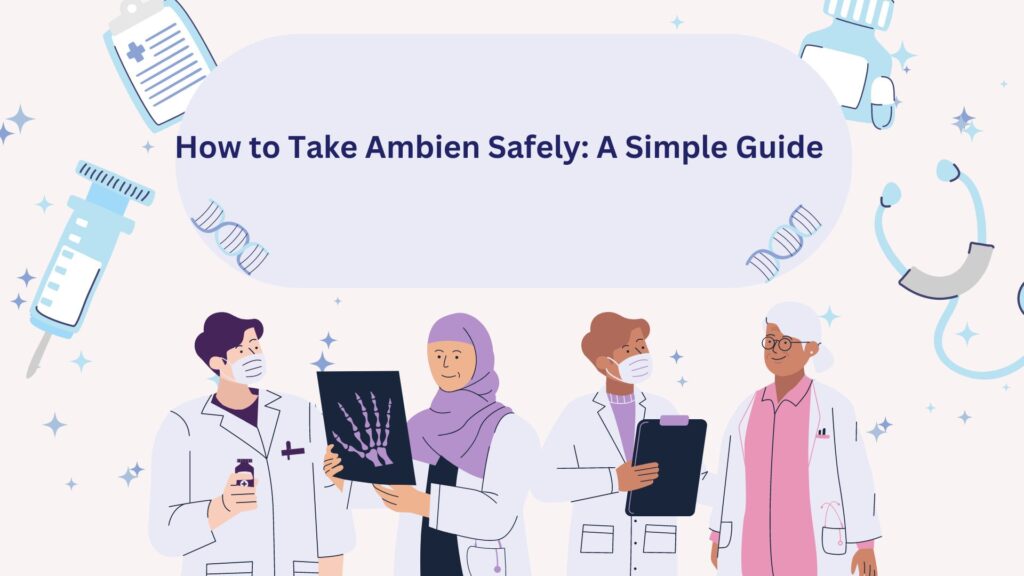Ambien (zolpidem) is a medication commonly prescribed to help people with sleep problems like insomnia. It’s a sedative that helps you fall asleep quickly and stay asleep through the night. While it can be very effective, taking Ambien safely is essential to avoid side effects, dependence, and other health risks.
In this guide, we’ll cover everything you need to know about taking Ambien safely, including how it works, proper usage, potential risks, and tips for minimizing those risks.
What is Ambien?
Ambien is a prescription medication used to treat insomnia, a condition where people have trouble falling asleep or staying asleep. Ambien belongs to a group of medications called sedative-hypnotics, which work by slowing down brain activity to help you relax and fall asleep. It’s usually prescribed for short-term use, often no longer than a few weeks, because it can become less effective over time and lead to dependence.
Ambien comes in two forms:
- Immediate-release Ambien: This helps you fall asleep quickly and is typically prescribed for people who have trouble falling asleep at the start of the night.
- Extended-release Ambien (Ambien CR): This has a second layer that dissolves more slowly, helping you stay asleep throughout the night. It’s usually for people who wake up frequently during the night.
How to Take Ambien Safely
Taking Ambien properly is key to ensuring it helps with your sleep issues while minimizing the risk of side effects. Here are the steps to take Ambien safely:
-
Follow Your Doctor’s Instructions
your doctor will prescribe Ambien based on your specific sleep issues. It’s crucial to follow their guidance on how much to take and when to take it. Don’t take more than the prescribed dose, and don’t take it for longer than recommended.
-
Take Ambien Right Before Bed
Ambien works quickly, often within 15 to 30 minutes, so it’s important to take it only when you’re ready to go to bed. Make sure you have at least 7 to 8 hours to devote to sleep after taking Ambien to avoid feeling groggy or drowsy the next day.
Like all medications, Ambien can cause side effects. Most of these are mild and may go away as your body gets used to the drug, but some side effects can be more serious.
Common side effects include:
- Drowsiness: It’s normal to feel drowsy after taking Ambien, as it’s meant to help you sleep. However, some people feel groggy the next morning, especially if they didn’t get a full night’s sleep (7 to 8 hours).
- Dizziness: Ambien can cause dizziness or lightheadedness, which is why it’s important to avoid driving or operating machinery until you know how the drug affects you.
- Headache: Some people experience headaches as a side effect of Ambien, though this is less common.
Serious Side Effects
While serious side effects are less common, it’s important to be aware of them. If you experience any of these symptoms, contact your doctor immediately:
- Sleepwalking or Sleep Activities: Some people have reported doing activities like walking, eating, or even driving while not fully awake after taking Ambien. These behaviors can be dangerous, especially if you don’t remember them the next day. If this happens to you, stop taking Ambien and speak with your doctor.
- Memory Loss: Ambien can cause short-term memory problems, especially if you don’t get a full night’s sleep after taking it. This can make it hard to remember events that happened after you took the medication.
Risks of Long-Term Ambien Use
Ambien is typically prescribed for short-term use because long-term use can lead to several risks, including:
- Tolerance: Over time, your body may get used to Ambien, meaning you’ll need higher doses to get the same effect. This can increase the risk of dependence and side effects.
- Dependence: Taking Ambien for long periods can lead to physical or psychological dependence, where your body or mind feels like it can’t sleep without the medication. This makes it hard to stop taking Ambien, even if you no longer need it.
- Withdrawal Symptoms: If you’ve been taking Ambien for a while and stop suddenly, you may experience withdrawal symptoms such as anxiety, sweating, tremors, and rebound insomnia (when your sleep problems return and are worse than before).
Tips for Taking Ambien Safely
If you’re prescribed Ambien, here are some tips to help ensure you’re using it safely: Buy Ambien online safely and conveniently from trusted sources for effective sleep relief.
- Use Ambien for Short Periods
Ambien is not meant for long-term use. It’s designed to help you get through a short period of sleep trouble. If your insomnia persists, talk to your doctor about other treatment options, such as cognitive-behavioral therapy (CBT) or lifestyle changes. - Create a Sleep Routine
Establishing a regular sleep routine can help improve your sleep quality without the need for medications. Try to go to bed and wake up at the same time every day, even on weekends. Avoid screens (phones, TVs, computers) for at least an hour before bed, and make your bedroom a calm, relaxing space. - Discuss All Medications with Your Doctor
Make sure your doctor knows about all medications and supplements you’re taking before starting Ambien. This will help avoid any dangerous drug interactions.
Conclusion
Ambien can be an effective solution for short-term sleep problems when used properly. However, like all medications, it comes with risks, especially when taken for long periods or in higher doses than prescribed. To take Ambien safely, follow your doctor’s instructions closely, avoid alcohol and other sedatives, and use it only for short-term sleep relief. If you have trouble sleeping over a long period, talk to your doctor about other treatment options that may be more suitable for long-term use. for more information please visit huroncoastdental






